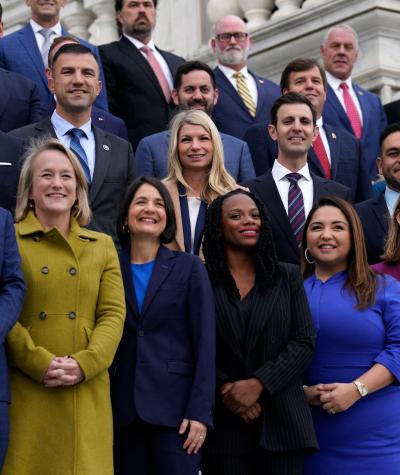The newly-elected Congress is the most diverse in history, but it falls far short of mirroring the breadth of diversity we have in this country. Revising a problematic campaign finance regulation could help improve our representative democracy by reducing the de facto personal wealth requirement for seeking elected office.
While the U.S. population is about 59% non-Hispanic white, 75% of Congress identifies as white. Similarly, while women make up half of our country, they comprise only 28% of our federal legislators. And a majority of our elected representatives are millionaires, with the average representative possessing a net worth five times greater than the average American.
While there are many structural factors causing these disconnects, the Federal Election Commission (FEC) – the federal agency tasked with regulating money in politics – is currently considering a regulatory change that could make our campaign finance system fairer, and also help reduce some of the financial obstacles that currently make it all but impossible for ordinary Americans to run for federal office.
The FEC’s “candidate salary” rule restricts the compensation that federal candidates may draw from their campaign while running for office. The rule serves an important function of preventing candidates from improperly using campaign donations for self-enrichment. But the current version of the rule unfairly exacerbates disadvantages experienced by candidates lacking personal wealth – a group that, for historical and ongoing reasons, tends to be disproportionately composed of women and people of color.
In particular, the rule has several key flaws that make it especially difficult for non-wealthy candidates to mount competitive campaigns for Congress and the White House.
First, under the existing rule, the maximum salary a candidate may draw from their campaign is the lesser of the minimum salary paid for the office sought or the candidate’s actual earned income during the year prior to running for office. So if the candidate didn’t earn income during the previous year – perhaps because they provided care for a child or elderly parent, returned to school, or were laid off from their job – they cannot receive a salary from their campaign.
That creates an obvious problem for anyone that isn’t wealthy enough to forgo a salary while campaigning. Running for office, particularly in a competitive race, is often a full-time job, so a candidate ineligible for a campaign salary might be unable to both run a competitive campaign and support themselves and their family.
The current rule thus forces people without accumulated wealth to choose between running for office while struggling to get by – at a time when they may be incurring new expenses, like needing to pay for childcare while on the campaign trail – or foregoing the opportunity to serve their community. Understandably, many people choose the latter.
The better approach would be to avoid capping a candidate’s salary based on prior earned income.
Second, the FEC has interpreted its salary regulation to prohibit campaigns from paying a candidate’s healthcare premiums. Because campaigning tends to require a person’s full attention, many people quit their jobs or otherwise must turn down outside employment to run for office. But most people get healthcare through their job, so choosing to run for office may mean losing access to employer-sponsored healthcare.
Allowing candidates to access the same healthcare options available to hired campaign staff would appropriately address that dilemma where a candidate’s healthcare need arises as a consequence of their decision to run for office.
Third, under the current rule, candidate salaries are arbitrarily linked to the filing deadline for access to the primary election ballot (which is set by state law), or January 1 of the election year if the state does not conduct a primary. States’ ballot access deadlines vary widely, so the rule treats candidates for similar offices differently. In some states, this rule functions to prevent candidates from receiving a salary until just two months before their primary, substantially undermining the intended benefit of the rule to those candidates. Candidates lacking personal wealth who might otherwise run for office may choose not to do so because they cannot afford to go months without any income.
The candidate salary restrictions serve an important function of preventing abuse of our campaign finance system by candidates who might use campaign donations to enrich themselves. But it is possible to advance that important goal in a way that avoids erecting unnecessary obstacles to running for office for people who lack personal wealth.
The FEC is currently reexamining its rule on candidate compensation, and Campaign Legal Center (CLC) has submitted multiple comments urging the FEC to use this opportunity to update its rule and reduce unnecessary barriers that non-wealthy people face when running for federal office.
Of course, these reforms are far from a complete solution to the lack of diverse representation in our government. But updating the candidate salary rule would be an important step to make it easier for people from all economic backgrounds to pursue elected office and could help make our democracy more representative of all Americans.

